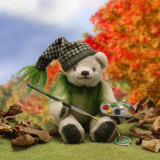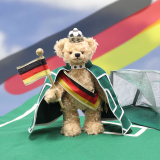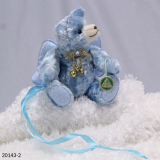- Produktbeschreibung
Kleiner Himmelsbote 23 cm
Artikelnummer: 20143-2
Merkmale:
Name: Kleiner Himmelsbote
Made with Swarovski ® Elements
Made in Germany
Klein-Limitierung: 25 Stück - weltweit
Nummerierung: einzeln nummeriert mit einem echt vergoldeten Metallplättchen, eingenietet am linken Oberschenkel des Bären, auf dem die individuelle Limitierungsnummer eingraviert ist
Modell: 5-fach gegliedert mit drehbaren Armen, Beinen und Kopf, mit HERMANN-Halsmarke, HERMANN-Einnähetikett und HERMANN-Anhängeplombe, mit Echtheitszertifikat
Modellart: der Bär mit eingesetzter Schnauze
Größe: 23 cm = 9 inches
Besonderheit Fell: aus wertvollem Original Kunstseidenplüsch aus dem HERMANN-Archiv der späten 1940er Jahre
Schnauze: weißer Mohair rasiert
Sohlen und Pfoten: aus in sich gemustertem Seidenstoff
Füllung: handgestopft mit Holzwolle
Besonderheit Augen: mit braunen Original Glasaugen aus dem HERMANN-Archiv der 1950er Jahre
Schnauze und Mund: handgestickt
Flügel: aus in sich gemustertem Seidenstoff und Wollstoff
Schmuck: mit einem Halsband, das geschmückt ist mit drei goldfarbenen, hell klingenden Glöckchen und einem großen Swarovski ® Kristall in der Mitte.
Besonderheit Design: am Rücken des Bären befindet sich eine Schlaufe durch die ein Seidenband gezogen ist, so dass der kleine Himmelsbote Bär zum "Fliegen" aufgehängt werden kann
Größe: 23 cm
Höhe der Limitierung in Stück: 25
Kunstseide
Kleine Materialkunde
Die Ära der Kunstseidenbären ist ein bisher kaum beleuchtetes Kapital in der Geschichte der Teddybären. Nur wenige wissen um die Kostbarkeit dieser Kunstseidenbären Bescheid. In den 1930er Jahren entwickelt, dienten Kunstseidenplüsche in erster Linie der damaligen Intention, vom Import der wertvollen Mohairfaser unabhängig zu werden. Als während und nach dem Zweiten Weltkrieg Mohair überhaupt nicht mehr verfügbar war, entstand als typischer Vertreter der Nachkriegsbären in den 1940er und 1950er Jahren der Kunstseidenbär. Erst später - in der Zeit des wirtschaftlichen Aufschwungs - als der Mohairbär wieder die Regale der Spielzeugläden füllte, wurde der "billigere" Kunstseidenbär auf die Jahrmarktsplätze verdrängt, bis er ganz vom Markt verschwand. Die Ära der Kunstseidenbären dauerte demnach nur wenige Jahre. Sie ist dennoch umso bemerkenswerter, als der Original Kunstseidenbär in seiner ursprünglichen Art nicht mehr hergestellt werden kann. Einst als "Schmuddelkinder" auf dem Spielzeugmarkt eingestuft, stellen Kunstseidenbären heute eine außergewöhnliche Kostbarkeit dar, da sie nur noch in soweit reproduziert werden können, wie Original alte Kunstseidenplüsche in den Archiven der alten Traditionshersteller lagern.
Bei Kunstseide handelt es sich um die historische Bezeichnung für ein halbsynthetisches Plüschmaterial aus Cellulose. Halbsynthetisch bedeutet in diesem Zusammenhang, dass der Ausgangsstoff - anders als bei den heutigen vollsynthetischen Plüschen - ein pflanzlicher Naturstoff ist. Den Beinamen "Seide" erhielten Kunstseidenplüsche vor allem wegen ihres seidigen Glanzes. Außerdem sind ihre Florfäden genau wie bei der Naturseide sehr fein und ähnlich geschmeidig. Echte, Original Kunstseidenplüsche können heute aus technischen Gründen nicht mehr gewebt werden. Die dazu notwendigen Spezialmaschinen, die früher diese feinen Cellulosefasern verarbeiten konnten, sind nicht mehr einsatzfähig. Die meisten dieser alten Maschinen wurden verschrottet. Teddybären aus Original alten Kunstseidenplüschen sind deshalb heute besonders rar und genießen in Sammlerkreisen höchste Beachtung.
Mit Holzwolle gestopfte Klein-Teddys - ein wahrer Raritätenschatz
Mit Holzwolle gestopfte Klein-Teddys gehören zum Raritätenschatz der Bärenwelt und sind heute auf dem Sammlermarkt kaum noch zu finden. Was früher zum täglichen Handwerk der Teddybärenmacher gehörte, ist zur Kunst geworden. Weltweit gibt es nur noch eine Handvoll Experten, die heute noch das Handwerk des Holzwollstopfens beherrschen. Eine jahrelange Ausbildung und ein künstlerisches Gespür für Formgebung sind erforderlich, um den sehr zeitaufwendigen Arbeitsgang des Holzwollstopfens auszuführen.
Seit über 100 Jahren pflegen wir die Tradition des Stopfens unserer Teddyären mit Holzwolle und haben uns diese alte Handwerkskunst auch für die Herstellung unserer Klein-Teddys erhalten. Dies macht unsere Teddybären zu unvergleichbaren und einzigartigen Geschöpfen mit werterhaltendem Charakter.
Der Bär mit eingesetzter Schnauze
Modell-Erklärungen
Beim "Bär mit eingesetzter Schnauze" handelt es sich um eine Modellart, die von Max Hermann in den 1920er Jahren entwickelt wurde. Bei diesem Modell besteht die Schnauze aus einem kürzerflorigen Mohairplüsch als der Bär selbst. Sie wird gesondert zugeschnitten und an das Kopfteil des Bären angenäht. Mit dieser Modellvariante wurden die Teddybären von Max Hermann bekannt und berühmt. Wie kaum ein anderes Bärendesign ist der "Bär mit der eingesetzten Schnauze" mit dem Namen HERMANN verknüpft und hat Geschichte geschrieben. Noch heute ist diese Gestaltungsart das bevorzugte Teddybären-Modell in unserem Hause.
Made in Germany - Hergestellt in Deutschland![]()
Achtung!
Hochwertiger Sammlerartikel. Dieses Produkt ist kein Spielzeug im Sinne der Spielzeug-Richtlinie (2009/48/EG Anhang I, 2 c + d). Dieser Artikel ist ausschließlich für erwachsene Sammler im Alter von mindestens 14 Jahre bestimmt.
Angaben zum Hersteller des Artikels:
Hermann-Spielwaren wurde 1920 in Neufang bei Sonneberg von Max Hermann gegründet . Nach dem zweiten Weltkrieg verlegt der Gründer den Sitz des Unternehmens nach Coburg-Cortendorf. Hier ist es noch heute beheimatet.
Das Unternehmen ist einer der ältesten und traditionsreichsten Teddybärenhersteller der Welt. Made in Germany, Fertigung durch hochqualifizierte Fachkräfte liebevoll von Hand, Verwendung nur edelster Materialien und eine umfangreiche, kreative Kollektion zählen zu den Markenzeichen des Coburger Traditionsunternehmens. Gerade die Einzel- und Kleinstserienfertigung ermöglicht Teddybären und Plüschtiere mit einzigartiger Ausstrahlungskraft zu herzustellen. Jeder Teddybär ist für sich ein kleines Meisterwerk und Einzelstück, denn auch in einer Serienfertigung erhält jeder Teddy seinen eigenen Gesichtsausdruck, der seinen ganz persönlichen Charakter prägt.
Wohl auch deshalb wurden die Teddybären aus der Cortendorfer Manufaktur mit internationalen Designauszeichnungen überhäuft, wie der TOBY Award (Oscar der Teddybären), Golden Teddy Award oder dem TED worldwide Award.
Fachzeitschriften wie „Teddybär und seine Freunde“, „BärReport“, „Teddy & Co“ oder „Teddy Kreativ“ berichten regelmäßig über die neusten Kreationen aus Coburg. Doch nicht nur die Fachpresse ist regelmäßig zu Gast. Das Unternehmen ist bekannt aus einer Vielzahl von TV Berichterstattungen und Nennungen in Zeitschriften wie „Der Spiegel“, „Tina“, Süddeutsche Zeitung“, „The Times“ etc. Alle renommierten Fachbücher widmen den HERMANN-Coburg Teddybären eigene Kapitel, z.B. „The Teddy Bear Encyclopedia“.Das Unternehmen ist auch heute noch in Familienhand und wird von den Gründerenkeln geleitet.



